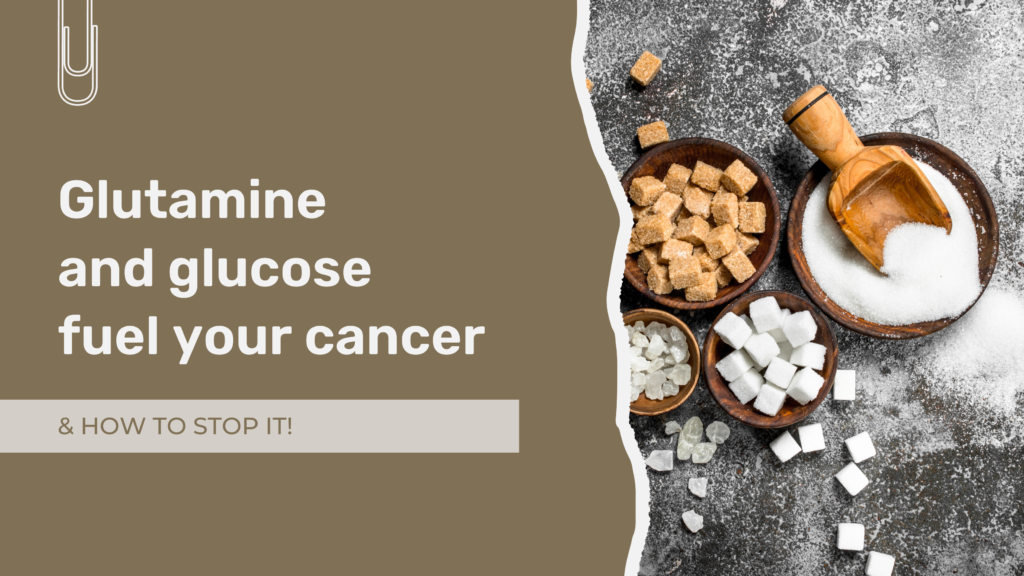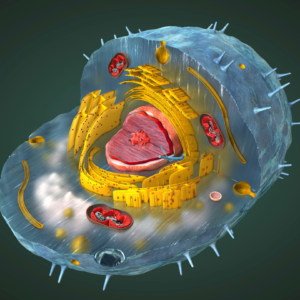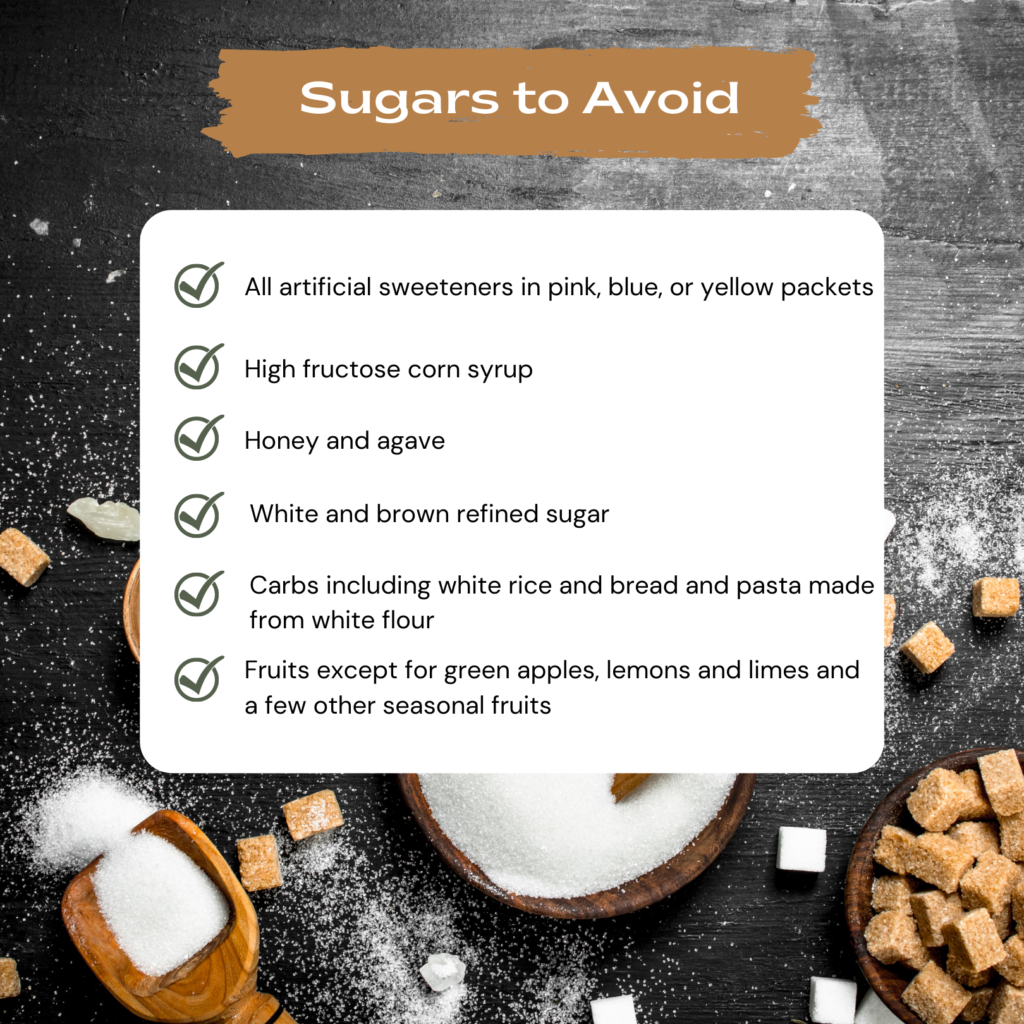
The old phrase, “You are what you eat,” is 110% true––especially when it comes to cancer. Glutamine and glucose power up cancer cells. However, you are empowered to turn off the power of glutamine and glucose (toxic sugars and carbs) from growing the cancer cells. All by what you eat––or really what you do not eat.
Cancer as a metabolic dis-ease
Cancer is a problem at the cellular level, in particular at the level of mitochondria within the cells. It is rarely a genetic disease (5% -10% at most). I dive deep into this cutting-edge research on a podcast episode with my friend Dr. Susan Wadia-Ells, a long-time cultural change agent. For decades she has been empowering women to question authority and take charge of their health. Her recent good news book, Busting Breast Cancer: Five Simple Steps to Keep Breast Cancer out of Your Body, is based on the new metabolic theory of cancer and details the political, economic, and biological reasons why we are living in an epidemic of Breast Cancer.
In a nutshell, the metabolic theory of cancer is based on the biological origin of cancer cells, Mitochondria, that powers your body. But when your toxic lifestyles (stressful relationships, substance abuse, highly processed foods, lack of exercise, etc.) “suffocate” your mitochondria, they are forced to thrive on sugar (glucose and glutamine).
Mitochondria and cancer
 Mitochondria are responsible for cellular metabolism and respiration. Think of them as the lungs of cells. They use oxygen and nutrients to create fuel for each cell and keep cells healthy and able to adapt to stress. Make sure you keep your mighty mitochondria healthy by cutting sugar, exercising, taking key supplements, eating healthy fats, and giving them oxygen via deep breathing and exercise tools such as LiveO2. By doing all of this, it will help the cancer to loose steam and wither away.
Mitochondria are responsible for cellular metabolism and respiration. Think of them as the lungs of cells. They use oxygen and nutrients to create fuel for each cell and keep cells healthy and able to adapt to stress. Make sure you keep your mighty mitochondria healthy by cutting sugar, exercising, taking key supplements, eating healthy fats, and giving them oxygen via deep breathing and exercise tools such as LiveO2. By doing all of this, it will help the cancer to loose steam and wither away.
Dr. Thomas Seyfried of Boston College, an expert in cellular metabolism, as well as many other experts, view all cancers as one disease in which damaged mitochondria prefer glucose and glutamine as a fuel source. Research proves healthy cells do best when they burn fat as fuel. However, they can also use almost any substance to keep themselves alive and energized. Cancer cells must have glucose and glutamine to survive. Nothing else will do. Therefore, you can control the cancer by limiting glutamine and glucose as sources of fuel.
Dr. Susan Wadia-Ells provides a simple and helpful car analogy of this theory:
Today, mainstream oncologists are focused on issues with exhaust (symptoms of cancer and types of cancer) from the car. A doctor who approaches health with a metabolic approach will say “Stop putting oil and gas in the car.” Then it won’t even be able to start up and run.
Glutamine, glutamate, and cancer
Glutamine is the most prevalent amino acid that our bodies make, utilize, depend on to be healthy. It is also found in both animal and plant protein. Glutamine is transferred throughout the body, and 25% is found in your brain. This amino acid helps your gut and brain function and builds up the immune system for times of stress. Glutamine is manufactured in the muscles. Issues arise when you put too much glutamine into your body via supplements and foods such as red meats, dairy, and wheat.
Glutamate is also a non-essential amino acid and acts similarly to glutamine, and is made by glutaminase enzymes. Clear evidence shows that glutamate receptors are found on cancer cells. If a cancer cell can not be fueled by glucose, it turns to glutamate. Breast cancer cells emit high levels of glutamate and this is linked with more bone metastases.
Glutamine and glucose are interdependent. “Essentially, if you don’t have glutamine, the cell is short-circuited due to a lack of glucose, which halts the growth of the tumor cell,” says Dr. Don Ayer of the University of Utah and Huntsman Cancer Institute in his study on sugar feeding cancer.
Glucose and cancer
Glucose comes from the Greek word “sweet.” Glucose gets into your body from eating refined sugar products and refined foods such as white flour products, white rice, and fruit juices. The fruit juices I am talking about are highly processed juices, not fresh pressed breast cancer-fighting juices. Cancer cells have more insulin receptor sites for glucose compared to healthy cells – this means cancer cells get fed first when it comes to refined sugars. Think of a PET scan – what lights up first? The cancer cells.
One of the worst types of sugars to eat if you are on a healthy breast protocol is sucrose or basic table sugar. Since they are a combination of both glucose and fructose, it is especially hard for your body to process. Furthermore, they are synthetically made and rob your body of essential trace minerals.
A groundbreaking study in the journal “Cancer Research” looked at the effects of sugar on breast cancer tumors. It found that “sucrose consumption increased breast tumor growth and increased metastasis of breast cancer cells into the lungs.”
The researchers found that sucrose intake in mice comparable to levels of Western diets led to increased tumor growth and metastasis when compared to a non-sugar starch diet.
Another study done at UCLA proved how simple it is to kill cancer cells: deprive them of glucose. The researchers discovered that depriving cancer cells of glucose or sugar activated metabolic pathways that lead to cancer cell death.
Prevent cancer tumors by avoiding foods and drinks high in sugar. Since sugar comes in all shapes and forms, it is important to read food labels and avoid most sugar. Also, limit your intake of carbs and whole grains as they eventually are broken down into simple sugars.

Recipes that are really free of sugar
Ok, Dr. V, what in the world am I going to eat?! First, replacing toxic sugars with alternatives is totally possible! Stevia is a non-caloric herbal sweetener that is perfectly safe and non-toxic. Use it in baking and for sweetening your teas and lemonades. Some people enjoy the liquid version compared to the powdered one. Also, alternatives such as coconut sugar and monk fruit will make you not miss toxic sugar at all.
- Blueberry Cheesecake: Yes, you read that correctly! I love a good Cheesecake but not the dairy and sugar that comes with it. So I am excited to share this delectable gluten-free, egg-free, dairy-free, and sugar-free alternative. Spoiler-alert – creamy cashews are the secret behind this yummy slice of heaven!
- Peanut Butter Ice Cream Bars: These delicious, full-filling, and energizing chocolate and peanut butter happiness without toxic sugars, chemicals, and preservatives! It tastes like perfection to me!
- The Ultimate Donut Pie: This dreamy dessert is rich in protein, healthy fats, and flavor! All while being grain and sugar-free.
- Find more delightful dessert and sugar-free recipes in The Breast Cancer Conqueror Recipe Library.
Knowing what to eat, or not eat, what supplements to take, or not take is critical for creating Vibrant Health. Ultimately, the big question to ask yourself: What aspect of my lifestyle may be supporting cancer cell growth? be Each of The 7 Essentials hold the clues. Only by seeing the big picture of your life, from your stress levels to your oral health and what you put IN your body (like glucose and glutamine) can you then get to the root cause of what has allowed the cancer to show up.
The 7 Essentials System® for preventing and healing breast cancer
7 Essentials System® is a complete step-by-step educational program that shows you how to prevent “dis-ease” and create vibrant health naturally. By transforming your lifestyle over a relatively short period of time, you start seeing results in your health and in your life. When you shift the way you have been doing things most of your life, everything changes and you start living a healthier, happier more fulfilling life.
I have leaky gut and glutamine supplements is recommended for healing leaky gut. We know glucose (sugar) feed cancer cells but glutamine also feed cancer cells?
Yes, it can.
Not so sure about this?
Perhaps this is a too little too much thing. Bone broth has lots of Glutamine and is such a power house for healing. I question this information on Glutamin, need more evidence of this
Hello, Thanks for your great article. I found this article that explains the relationship between glutamine and glutamate. You all might want to consider adding the 10 foods that can block glutaminase (in research) to your article. P.S the peanut butter icream bars recipie seems out of place here as peanuts are not great for cancer patients…I think??? Thanks again you are doing such wonderful work!
The 10 foods
EGCG (Green tea)
Curcumin (Turmeric root)
Lycopene (Tomatoes)
Ursolic Acid (Holy basil, pistachio nuts)
Resveratrol (Red grape skins)
Honokiol, magnol (Magnolia Bark Extract)
Graviola (Soursop)
Sulforaphane (Sprouting seeds)
Valerian
Withanolide (Ashwagandha)
Thanks for the great list. Interestingly these are all things that weaken BC stem cells and CTC’s as well!!
I have heard it said leaky gut can be associated with H-Pylori, and Oil of Oregano Capsules are a Natural Antibiotic to kill down/off the H-Pylori infection and after the gut can then repair itself there may not be any more need for Glutamate Supplements. A few of my Professor’s mentioned in some coursework classes they have never seen any clients that were given a CA medical labeling that also was given a positive result for H-Pylori infection; of which I find very interesting.
Chris Woolams has written on the Canceractive Uk website that peanuts should not be eaten. This obviously includes peanut butter. Please would you check this out.
That’s true! Peanuts are a legume that is high in lectins and mycotoxins. That means that the body can’t “burn them cleanly” and that they have a fungus naturally in them that releases toxins… doesn’t sound yummy to me!
Following a lumpectomy for ER+ breast cancer I have found out that my oxalate levels are sky high. How on earth do I combine a low oxalate diet with the recommendations in this article? It is all so difficult. Help! please!
Hi Gabriella! It would be important to look at your complete situation to help you make those decisions. Have you thought about BCC Private coaching?
Hi, can I use Xylitol in stead of stivia?
Regards,
Karin
Sugar alcohols are not the best for the gut. In fact, if you have too much, you’ll know it… your body will inform you with soupy poops! Stevia glycerite is a much better choice.
Hiya, should there be an active hyperlink to “breast cancer-fighting juices” mentioned above?
Yes. It will be updated soon. Sorry for the inconvenience!
Grand, Thanks!
Let the juicing commence!
Please explain to me the difference. I was low in glutathione. Is there any relation between Glutamine & Glutathione? My naturopath prescribed a Glutathione supplement. Should I continue with this supplement? BTW, Thank You so very much for all the support and information!!! Truly Blessed to be a part of this group of strong amazing women!
Hi Kim! Glutathione is made from glutamine, glycine and cysteine and is considered “the Master Antioxidant” not only because it is a powerful antioxidant by itself, but because it can “recharge” all the other antioxidants so that they can be used again and again. Therefore, glutathione is a very important supplement… until it’s not. By that I mean that sometimes, when we get the RGCC, or “Greece test” results back, it tells us that the cancer cells can use glutathione for fuel. Most don’t have this (so supplementing is a good idea), but every now and again, that result is high and it’s not a good idea. I don’t know of another way to test it besides RGCC. For most it is a good idea, but it is completely your decision.